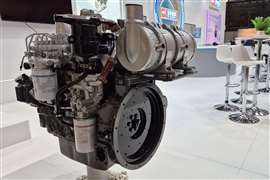Read this article in Français Deutsch Italiano Português Español
AVL conference explores maritime decarbonisation
17 April 2024
 AVL’s KangKi Lee (centre) thanks Claus Graugaard (far right) for his keynote presentation (Photo: PPI)
AVL’s KangKi Lee (centre) thanks Claus Graugaard (far right) for his keynote presentation (Photo: PPI)
AVL is a company which specialises in the development and testing of drivetrains for power applications used across a series of industries, including off-highway machines, on-highway trucks and commercial shipping.
Power Progress International travelled to Graz, Austria to attend the 10th AVL High Power Systems Conference, which brought together industry executives to discuss how the global shipping industry can achieve – and possibly exceed – future decarbonisation and sustainability goals.
The general consensus across the conference was that delivery of these emissions reductions will come through the introduction of new engine technologies supporting new fuels. But such is the breadth of this development area that it will take a concerted effort by the wider industry to develop, test and launch these solutions.
“We need to collaborate more, it’s the only way to achieve our common goal,” said KangKi Lee, AVL’s senior vice president, High Power Systems in his opening remarks.
Following on from that point, in his keynote presentation Claus Graugaard, chief technical officer at the Maersk McKinney Meller Center for Zero Carbon Shipping noted: “Collaboration is key, as the complexity of what we face cannot be changed by any single group.”
According to figures presented by Graugaard, the maritime sector currently uses about 300 million tonnes of fuel oil each year. This produces about 1.2 gigatonnes of related emissions. Even with current efforts to reduce these emissions, the industry will fall well short of the 2050 targets outlined in the Paris Accord.
“The gap between the Paris Accord emissions reduction timeline and the current path of [shipping] decarbonisation is our working space at Maersk McKinney,” said Graugaard. “Well-to-wake is embedded in our DNA.”
Thomas Hansen, head of Sales and Promotion, Two-Stroke Marine at MAN Energy Solutions, spoke about how it was imperative that these emissions-reducing technologies be quickly launched into the market.
“By 2040, the global shipping fleet will grow by 60%. But [the industry] is required to reduce emissions by 70% by the same year,” he said.
Consideing those numbers, it would appear that the notoriously conservative global shipping industry would never make the necessary changes in time. But contrary to this, Hansen said that the industry was ready for the challenge and willing to adopt new technologies, particularly if they helped to keep companies competitive.
Graugaard and Hansen both pointed to the increasing number of ships being produced with engines using alternative fuels, such as methanol and ammonia, and how these would help the maritime industry to reduce its notorious carbon footprint.
MAN has sold nearly 200 methanol-fuel engines since they were introduced. According to Hansen, by 2027, methanol engines in global shipping will use about seven million tonnes of the fuel each year.
Making the switch from oil to methanol could be viewed as a risk, with the potential for methanol consumption to possibly outstrip supply. But he said that according to the Methanol Institute, annual production of the fuel is expected to reach 70 million tonnes by 2027, far in excess of the industry’s annual consumption.
Likewise, ammonia looks set to take a share of the maritime power market. According to Hansen, forecasts carried out by MAN predict that the number of ships using methane/LNG power will decline in favour of those using ammonia.
While he confessed that such forecasts were subject to rapid recalculation due to market swings, he was certain of this: “The future market fuel mix will be diverse.”
POWER SOURCING GUIDE
The trusted reference and buyer’s guide for 83 years
The original “desktop search engine,” guiding nearly 10,000 users in more than 90 countries it is the primary reference for specifications and details on all the components that go into engine systems.
Visit Now
STAY CONNECTED




Receive the information you need when you need it through our world-leading magazines, newsletters and daily briefings.
CONNECT WITH THE TEAM













